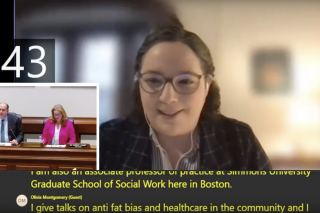“Anti-fatness,” explained Montgomery, “is the belief that being fat is a personal failing.” The impact of anti-fatness is evident in healthcare, the criminal justice system, the workplace, and parenting. In addition, people often pay higher prices for plus-size clothing, and airlines require the purchase of two airplane seats for a single passenger, based on their size — all while statistically earning less income than non-fat people .
To counteract negative stereotypes and assumptions based on weight, Montgomery offered facts. “Our body size isn’t solely, or even primarily, the result of our choices,” they said, noting that major contributing factors include genetics, environment, and health conditions not caused by weight. In addition, the constant cycle of gaining and losing weight due to frequent dieting is harmful to health.
“Being fat is not always unhealthy,” said Montgomery, though they also noted, “unhealthy people are still worthy of respect, dignity, and access to medical care, even if it is their choice, or the fault of their actions, that they are fat.” Further, assumptions about weight are often couched in harmful language depicting good health (or, more specifically, the outward appearance of it) as morally virtuous and fatness as a result of lazy or harmful behavior. As a response, the word “fat” has been reclaimed by many larger-bodied people as a descriptor, not an insult.
While efforts to promote body positivity may seem helpful, Montgomery clarifies why, for many, they miss the mark. “Body positivity is all about loving your body, but you can’t tell someone to ‘love themselves’ out of marginalization,” said Montgomery. Fat Liberation, which began with a manifesto released by Fat Underground in 1973, takes a different approach. “Fat liberation states that whether or not you love your body, you deserve access to care, treatment, and rights at any body size.”
To start dismantling our own biases, the first step is to acknowledge them. “Pay attention to how your anti-fatness shows up,” Montgomery advised. While asking feedback from friends and family about their experiences could offer important insights, understand that they may not be willing to share. An easy alternative is to diversify what you read, what you listen to, and what social media accounts you follow. This exposure may prepare you to respond to anti-fat comments, whether they are directed at yourself or others.
For social workers, Montgomery offered practical advice. “Consider accessibility in your space,” they suggested. “Offer chairs without arms that can handle greater weight capacity. Be mindful of assumptions. Ask yourself if discussions of [the client’s] weight is necessary.” Further, they encouraged social workers to consult resources from the Association for Size Diversity and Health (ASDAH), which offers a list of vetted healthcare providers who have demonstrated commitment to fat liberation.
The Massachusetts House of Representatives will report on the anti-fat discrimination bill on April 30, 2024. Learn about the results via the National Association to Advance Fat Acceptance campaign, Equality at Every Size, which tracks this legislation across the United States. “It is currently legal to discriminate against fat people on the basis of their body size in 48 states in this country, including Massachusetts. While it may seem obvious that everyone should have access to human rights at any size, that is not reflective of our reality. So let’s make it reality.”
Montgomery’s Recommended Readings
- Fat and Queer: An Anthology of Queer and Trans Bodies and Lives, Edited by by Miguel M. Morales, Bruce Owens Grimm, and Tiff Joshua TJ Ferentini
- Fearing the Black Body: The Racial Origins of Fat Phobia by Sabrina Strings
- Belly of the Beast: The Politics of Anti-Fatness as Anti-Blackness by Da’Shaun L. Harrison
- The Body is Not an Apology: The Power of Radical Self-Love by Sonya Renee Taylor
- Decolonizing Wellness: A QTBIPOC-Centered Guide to Escape the Diet Trap, Heal Your Self-Image, and Achieve Body Liberation by Dalia Kinsey
- Heavy, An American Memoir by Kiese Laymon
- Fat Activism: A Radical Social Movement by Charlotte Cooper
- Body Respect: What Conventional Health Books Get Wrong, Leave Out, and Just Plain Fail to Understand about Weight by Linda Bacon and Lucy Aphramor
- The Fat Studies Reader, edited by Esther Rothblum and Sondra Solovay
- Fat Talk: Parenting in the Age of Diet Culture by Virginia Sole-Smith
- What We Don’t Talk About When We Talk About Fat by Aubrey Gordon
- “You Just Need to Lose Weight” and 19 Other Myths About Fat People by Aubrey Gordon
Montgomery’s Recommended Listening
- Maintenance Phase: Wellness and weight loss, debunked and decoded
- Unsolicited - Fatties Talk Back
- Fierce Fatty Podcast with Victoria Welsby
- Why Won’t You Date Me? With Nicole Byer
- Body Liberation For All
- The Fat Lip Podcast
- She’s All Fat
- Bad Fatty
- Fat Doctor Podcast with Dr. Asher Larmie & Guests
- Fat Joy with Sophia Apostol

